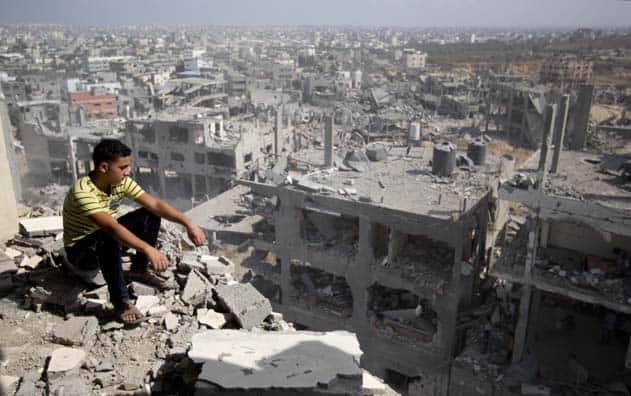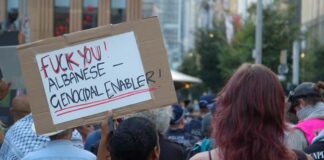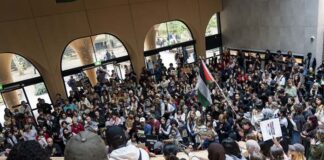After weeks of bombing and a ground invasion by Israeli troops, up to 30 per cent of Gaza’s population, or 520,000 people, are now without a home. There is little access to clean water or electricity. The sanitation system is in crisis and medical facilities are completely overwhelmed by the dying and the wounded. Nearly 2000 people are dead.
This is the terrible human toll of Israel’s aim to neutralise and disempower the dispossessed Palestinians. Israel is refusing Hamas’ terms for a truce, which centre on lifting the suffocating blockade Israel imposes on the Gaza strip, a basic humanitarian requirement.
The drive to destroy is built into the logic of Israel as an exclusive, Jewish-only settler state on Palestinian land. The existence of a dispossessed Palestinian population within and surrounding Israel’s borders is a permanent issue for Israel’s security and legitimacy. They can’t exterminate or expel all the Palestinian people, so they seek a compliant and controlled population.
Zionism and freedom for Palestinians are irreconcilable. So Israel’s cycle of war and terror on the Palestinians will continue. But Israel has not secured a definitive victory.
War aims
Israel used the pretext of three kidnapped settlers in the West Bank to launch their assault, their third since 2008. Israel’s leaders saw an opportunity to pummel the isolated Hamas government, destroy their tunnel infrastructure and try to divide Hamas from the Palestinian population.
Hamas has remained a threat to Israel, not because their military struggle is capable of actually defeating Israel, but because they have kept alive the notion of resistance, while the Palestinian Fatah government in the West Bank has become Israel’s partner in oppression. Hamas won elections in Gaza in 2006 due to this continuing commitment to resistance.
But rather than orient to revolutionary movements across the region, Hamas have, like Fatah, pursued a political strategy relying on sponsorship from various Arab states—previously Iran and Syria then more recently Egypt’s Muslim Brotherhood government. They were left isolated when Egypt’s military coup placed staunch Israel and US ally General Abdel Fattah al-Sisi in power last June.
Hamstrung, Hamas had begun to hand over government in Gaza to Fatah after reaching a power-sharing deal. Knowing their weakness, Israel stepped up its efforts to crush Hamas.
Unlike during their 2012 assault when the Muslim Brotherhood was in power in Egypt, Israel could count on the full support of the Egyptian government. On top of this, their concern about the growing power of Iran, whom they see as a threat to their domination of the region, has made Israel’s leaders keen to project their military strength. And domestically, Prime Minister Benjamin Netanyahu is under pressure from the growing fanatical, racist far right-wing to show no compromise with Hamas.
Political toll
Israel’s barbarity has been exposed on the world stage. Images of slain children in Gaza beamed around the world as Israel bombed schools, hospitals and shelters.
While the US political elite unconditionally back Israel and continued to arm them through the massacres, a Gallop poll showed two thirds of young Americans opposed Israel’s attack.
The movement for Boycott, Divestment and Sanctions (BDS) against Israel has strengthened. Starbucks in the Middle East were forced to release a statement explaining they do not deal with the Israeli Defence Forces, while Spain blocked future arms deals with Israel. An estimated 200,000 people marched in London on 9 August, the biggest pro-Palestine demonstration in UK history. Similar numbers marched in Cape Town, South Africa, in what many called the biggest protest since Apartheid.
Israel has faced stronger and more determined military resistance than in previous wars on Gaza. Sixty-seven Israelis, mostly soldiers, had been killed as we went to press, far surpassing the 13 Israeli deaths in Operation Cast Lead in 2008-2009.
But despite growing international isolation, Israel has proved once again it can slaughter with impunity. The retreat of the Egyptian revolution has left Gaza extremely vulnerable. Building solidarity with the Palestinian struggle is urgent. It is clearer than ever that the liberation of Palestine is inseparable from the regional struggles of the Arab working class against imperialism and against their own rulers.
By Amy Thomas






